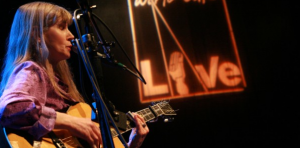Rory Block, who performed a concert for the Mississippi Blues Project, has released Avalon: A Tribute To Mississippi John Hurt on Stony Plain Records. The album is the fourth CD in her “Mentor Series.” Previous tribute have been to Rev. Gary Davis (I Belong to the Band), Mississippi Fred McDowell (Shake ’em on Down) and Son House (Blues Walkin’ Like a Man). Stream the album below from Spotify. From her biography:
“Mississippi John Hurt was a truly unique artist,” says Block, the most celebrated living female acoustic blues artist. “He left a resounding impact on our musical landscape. We think of him as outwardly mellow, sweet, and as one writer described it, singing in a ‘whisper.’ But have you pondered the words? Alongside gospel material, this gentle man sang about sex, murder, mystery, violence and steamy sensuality. It gets ever deeper the more you listen.
“Most people finger pick simply, carefully, and with enough volume to be heard and enjoyed. But next to the masters we can find ourselves tinkling away while the train pulls out of the station. Mississippi John Hurt bounced rhythmically from side to side while he was playing – did this bounce add power and jauntiness to the notes, or did his extra strong attack on the strings create the bounce? We can never do polite versions of these songs if we want to capture some of the power that made the originals great and enduring.”
Rory Block’s connection to Mississippi John Hurt goes back fifty years when they met in 1963. She continues:
“In December of 1963, I met Mississippi John Hurt at a concert in New York which also featured the great Old Timey musician Doc Boggs,” she recalled in her autobiography, When a Woman Gets the Blues. “We went backstage as we always did. Stefan Grossman was part of the accepted insiders group and we never needed special passes. Hurt’s presence was shy and gentle. His face was beautifully weather beaten; he wore a signature hat, and always had a mellow smile. I loved the way he rocked around when he played… it was a bounce that started slow and built up to a strong pace that carried the music. He had his own way of doing this – I never saw anyone else with this exact style of moving and playing. At times when I am performing I feel this energy come over me: the Mississippi John Hurt bounce energy.
I think it interesting to note that Mississippi John Hurt covered many Appalachian country songs,” adds Block. “This just underscores the exchange of musical styles that was going on in the early 1900s which few people understood. Mississippi John Hurt knew musicians who played Appalachian music (Doc Boggs for example), and many of the Old Timey players knew the blues pickers. At the age of 14, sitting on the porch of an old wood frame house in North Carolina, I heard Clarence Ashley say, ‘I learned this one from an old blues player’ and I heard Mississippi John Hurt talk about the country fiddle players he knew. What we have in the end is a true melting pot which included music from Africa, the British Isles, Flamenco (Hurt referred to open G tuning as ‘Spanish’), folk, jazz, popular contemporary music of the day, and probably even Classical music, to name some of the sources.”
Purchase Avalon: A Tribute Mississippi John Hurt here.
Listen to Rory’s Mississippi Blues Project concert here.
{ 0 comments }




